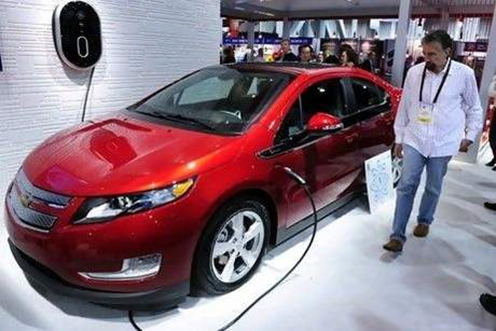In 2030 the planet will be home to 1.5 billion cars, but the big question is how many of them will be green. While most will have internal combustion engines and run on petrol, up to a third of the global fleet is expected to use some form of electric power, according to a study by PRTM, a consultancy.
And based on which countries have become trailblazers on the green road, it is likely that China, Japan, Europe and the US will figure prominently.
The Middle East, meanwhile, faces two hurdles: the current generation of electric batteries overheats in the region’s torrid summers and subsidized petrol is a strong disincentive to switch from traditional vehicles.
“Electric vehicles will take a couple of steps, and several years, to get there,” says Anil Khurana, a director at PRTM in Dubai.
What will be key, he points out, is the role of governments to get the electric vehicle industry “over the hump” and offer the right incentives to consumers, battery and car makers, and utility firms until the green motor industry gains momentum.
Dan Weisser, a principal at PRTM, describes electric vehicles as being in a “chicken-and egg” dilemma. “You don’t have the charging infrastructure because you don’t have the vehicles,” he says. “But you don’t have the vehicles because you don’t have the charging infrastructure.”
These challenges help explain why the oil industry has grown in tandem with the car sector across the world for the past century.
But the dominance of the petrol-guzzling internal combustion engine will gradually cede ground as electric vehicles become cheaper to operate, and utilities and private companies invest in infrastructure such as charging stations.
In the meantime, consumers have an alphabet soup of electric vehicle options.
Hybrid electric vehicles (HEVs), such as the Toyota Prius, combine internal combustion engines and electric propulsion.
Plug-in hybrid electric vehicles (PHEV), such as the Chevy Volt, are primarily electric vehicles with small combustion engines that extend range.
Pure electric vehicles (EVs), such as the Nissan Leaf, do not use petrol.
Governments are keen to promote electric vehicles on three grounds: they promote energy security and reduce dependence on foreign oil supplies, reduce pollution, and they offer countries a chance to move into the technology race and gain a slice of a growing lucrative global market.
In the US, the government offers US$7,500 (Dh27,545) rebates for electric vehicle purchases, and in 2009 authorized $2.4 billion in loans for battery developers and to finance pilot programs.
By 2040, up to 75 per cent of all kilometers driven in the US could be undertaken by electric vehicles as major fleet owners such as FedEx switch over, PRTM forecasts.
China, home to the greatest number of electric vehicle patents, is investing the most on EV pilot programs. A dozen cities are receiving $15bn in pilot programs to test various technologies, and the country has coal and nuclear power plants planned to cope with the extra demand from electrically powered cars.
“China is trying to jump the curve and catch up with Detroit or Japan,” Mr Weisser says. “It is saying, if we can be the leaders in electric vehicles, then we can start exporting to the rest of the world.”
Japan has the advantage of a home-grown car and battery industry, and the cost incentives. Like Europe, its petrol is among the costliest in the world because of high taxes.
Petrol is also high in India, which is going to make up much of the growth of vehicles worldwide by 2030, along with China. This would make it fertile ground for electric vehicles, but the country has a lot of catching up to do, Mr Khurana says.
“Like China, India wants to be leaders in this,” he says. “But they haven’t figured out the road map, or the investments.”
In the UAE, the Abu Dhabi Water and Electric Authority is conducting an EV study, and Masdar, the alternative energy company, is running trials on a small fleet of Mitsubishi innovative Electric Vehicles.
“We intend to work closely with the Department of Transport and other government entities to expand the pilot into Abu Dhabi,” says Buthaina al Mazroui, a senior analyst at Masdar. “We believe that there is no reason not to have thousands of electric vehicles on UAE roads within a few years.”
However, the cheap price of petrol is a stumbling block and “there is no economic case yet”, Mr Khurana says. What’s more, the hot environment could prove too much for today’s batteries. “Batteries would need to be liquid cooled, and charging stations would also have to have some cooling systems,” he adds. These upgrades are possible, but once again, the “economic case” could prove difficult, Mr Weisser says.
“Car makers haven’t addressed this yet, because the market is not here,” he says. “It is in cooler places, such as Europe.”



